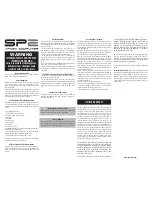
1-Port Phase Testing
54
NOTE:
If you have set this
Bias Voltage
to
On
, the instrument
will
supply a DC bias of
set level (12
– 30 V) from the
SMA
port
to
an
external bias-tee device.
Performing calibration
Perform the O-S-L Calibration by tapping the
Cal
icon in the right side bar. The instrument displays on-
screen instructions for you to follow through.
Making a measurement
Once the O-S-L calibration is done, the instrument is now ready to make a cable loss measurement.
Procedure
1
Disconnect the calibration kit from the calibration point.
2
Connect an antenna or feed line to the calibration point, which is usually at the extension cable end if
used.
3
Your measurement result is displayed on the screen in real time.
CAUTION
Do not apply or connect power exc30 dBm to the
Reflection /
RF Out
port. When the input signal power is greater than +30 dBm, it may cause a
damage to the CAA module and instrument.
NOTE
Do not change the connected port extension cable or frequency settings, or it
may cause a measurement error.
WARNING
Do not attempt to connect the instrument to the antenna when there is a risk of
lightning. Electric shock may cause malfunction of or damage to the instrument.
Summary of Contents for CAA06M
Page 2: ...1 CAA06M Cable and Antenna Analyzer User s Guide ...
Page 3: ......
Page 9: ......
Page 17: ...Introduction to CAA06M 8 ...
Page 21: ......
Page 27: ......
Page 42: ...CAA06M User s Guide 33 ...
Page 43: ......
Page 52: ...CAA06M User s Guide 43 DTF VSWR Smith chart measurement screen vertical layout ...
Page 53: ......
Page 59: ...1 Port Cable Loss Testing 50 ...
Page 65: ......
Page 71: ...Smith Chart Testing 62 ...
Page 77: ...2 Port Transmission Testing 68 ...
Page 95: ...Appendix 86 ...
















































